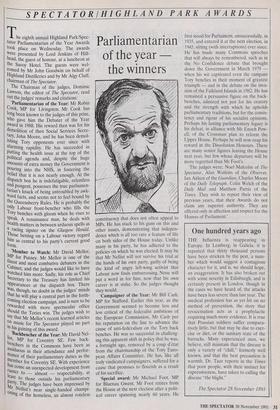SPECTATOR/HIGHLAND PARK AWARDS
Parliamentarian of the year the winners
The eighth annual Highland Park/Spec- tator Parliamentarian of the Year Awards took place on Wednesday. The awards were presented by Lord Jenkins of Hill- head, the guest of honour, at a luncheon at the Savoy Hotel. The guests were wel- comed by Mr John Goodwin on behalf of Highland Distilleries and by Mr Algy Cluff, chairman of The Spectator. The Chairman of the judges, Dominic Lawson, the editor of The Spectator, read out the judges' remarks and citations: 'Parliamentarian of the Year: Mr Robin Cook, MP for Livingston. Mr Cook has long been known to the judges of this prize, who gave him the Debater of the Year award in 1988. His reward then was for his demolition of then Social Services Secre- tary, John Moore, and he has been demol- ishing Tory opponents ever since with alarming rapidity. He has succeeded in putting the health issue at the top of the political agenda and, despite the huge amounts of extra money the Government is pouring into the NHS, in fostering the be lief that it is not nearly enough. At the dispatch box he is indefatigable, relentless and pungent, possesses the true parliamen- tarian's knack of being untroubled by awk- ward facts, and seems not to feel bound by the Queensberry Rules. He is probably the only Labour front-bencher who fills the Tory ory benches with gloom when he rises to speak. A renaissance man, he deals with health matters in between arduous spells as a racing tipster on the Glasgow Herald. Those betting on a Labour victory regard
him as central to his party's current good form.
`Member to Watch: Mr David Mellor, MP for Putney. Mr Mellor is one of the finest and most combative debaters in the Cabinet, and the judges would like to have watched him more. Sadly, his role as Chief Secretary to the Treasury has limited his appearances at the dispatch box. There was, though, no doubt in the judges' minds that .he will play a central part in the forth- coming election campaign, and is sure to .be rewarded with more spectacular office should the Tories win. The judges wish to say that Mr Mellor's recent learned articles on music for The Spectator played no part In his gaining of this award. Backbencher of the Year: Mr David Nel- list, MP for Coventry SE. Few back- benchers in the Commons have been as assiduous in their attendance and perfor- mance of their parliamentary duties as the Ht. ember for Coventry SE. With experience has come an unexpected development from least to — almost — respectability, at least to those outside his parliamentary 'try. The judges have been impressed by Mr Nellist's near single-handed champ- "log of the homeless, an almost voteless
constituency that does not often appeal to MPs. He has stuck to his guns on this and other issues, demonstrating that indepen- dence which is all too rare a feature of life on both sides of the House today. Unlike many in his party, he has adhered to the policies on which he was elected. It may be that Mr Nellist will not survive his trial at the hands of his own party, guilty of being the kind of angry left-wing activist that Labour now finds embarrassing. None will put a word in for him, now that his own career is at stake. So the judges thought they would. `Campaigner of the Year: Mr Bill Cash, MP for Stafford. Earlier this year, as the Government seemed to become less and less critical of the federalist ambitions of the European Commission, Mr Cash put his reputation on the line to advance the cause of anti-federalism on the Tory back benches. He was so successful in challeng- ing this apparent shift in policy that he was, a fortnight ago, removed by a coup d'etat from the chairmanship of the Tory Euro- pean Affairs Committee. He has, like all truly vindicated campaigners, suffered for a cause that promises to flourish as a result of his sacrifice.
`Special award: Mr Michael Foot, MP for Blaenau Gwent. Mr Foot retires from the House at the next election after a polit- ical career spanning nearly 60 years. He first stood for Parliament, unsuccessfully, in 1935, and entered it at the next election, in 1945, sitting (with interruptions) ever since. He has made many Commons speeches that will always be remembered, such as in the No Confidence debate that brought down the Government in March 1979 when his wit captivated even the rampant Tory benches in their moment of greatest triumph — and in the debate on the inva- sion of the Falkland Islands in 1982. He has remained a persuasive figure on the back- benches, admired not just for his oratory and the strength with which he upholds parliamentary traditions, but for the consis- tency and rigour of his socialist opinions. Perhaps his lasting parliamentary legacy is his defeat, in alliance with Mr Enoch Pow- ell, of the Crossman plan to reform the Upper House. Perhaps he will now reap his reward in the Dissolution Honours. There are many senior figures leaving the House next year, but few whose departure will be more regretted than Mr Foot's.
The judges were: Noel Malcolm of The Spectator, Alan Watkins of the Observer, Ian Aitken of the Guardian, Charles Moore of the Daily Telegraph, Colin Welch of the Daily Mail and Matthew Parris of the Times. They wish to repeat their view of previous years, that their Awards do not claim any superior authority. They are offered only in affection and respect for the Houses of Parliament.'










































































 Previous page
Previous page